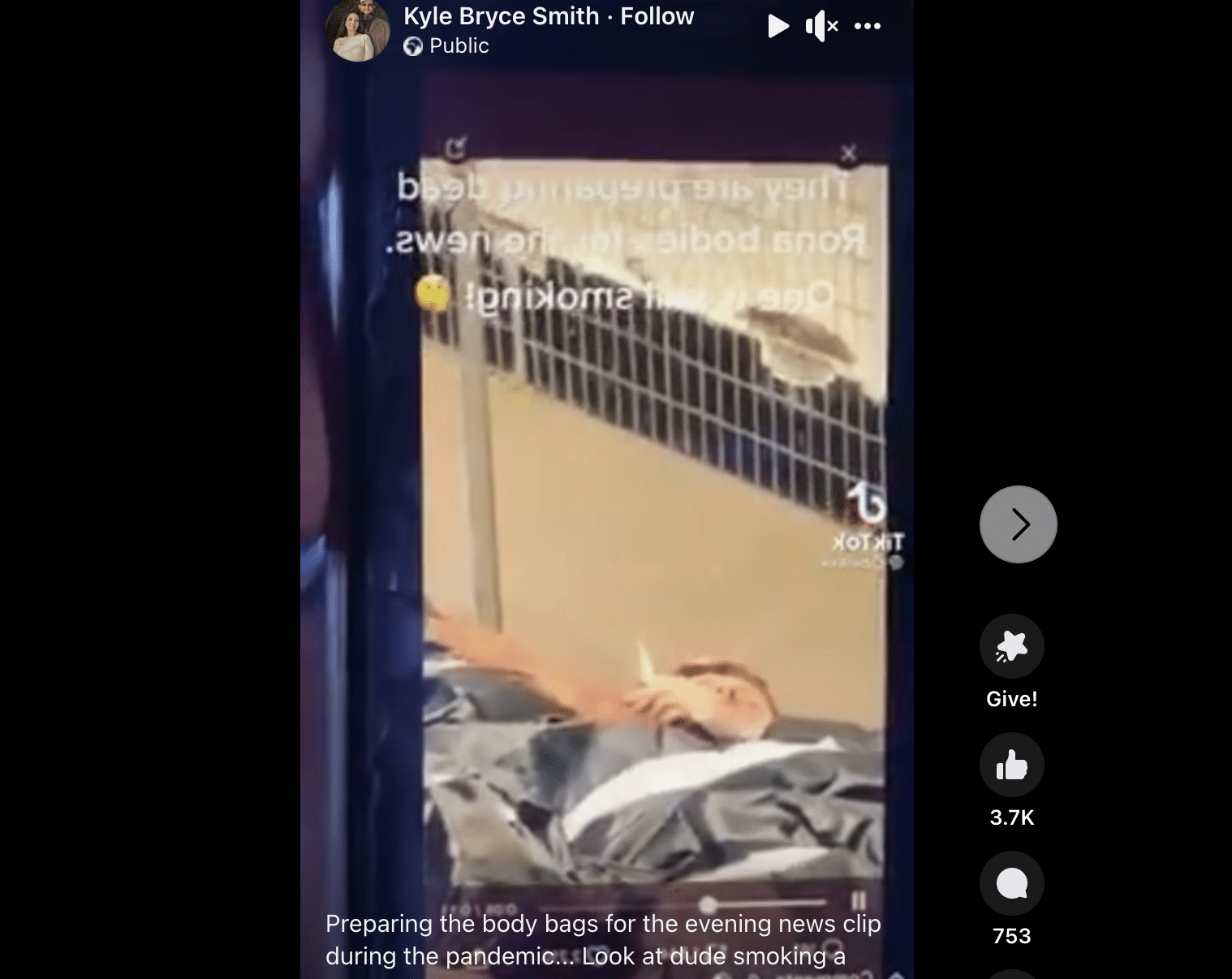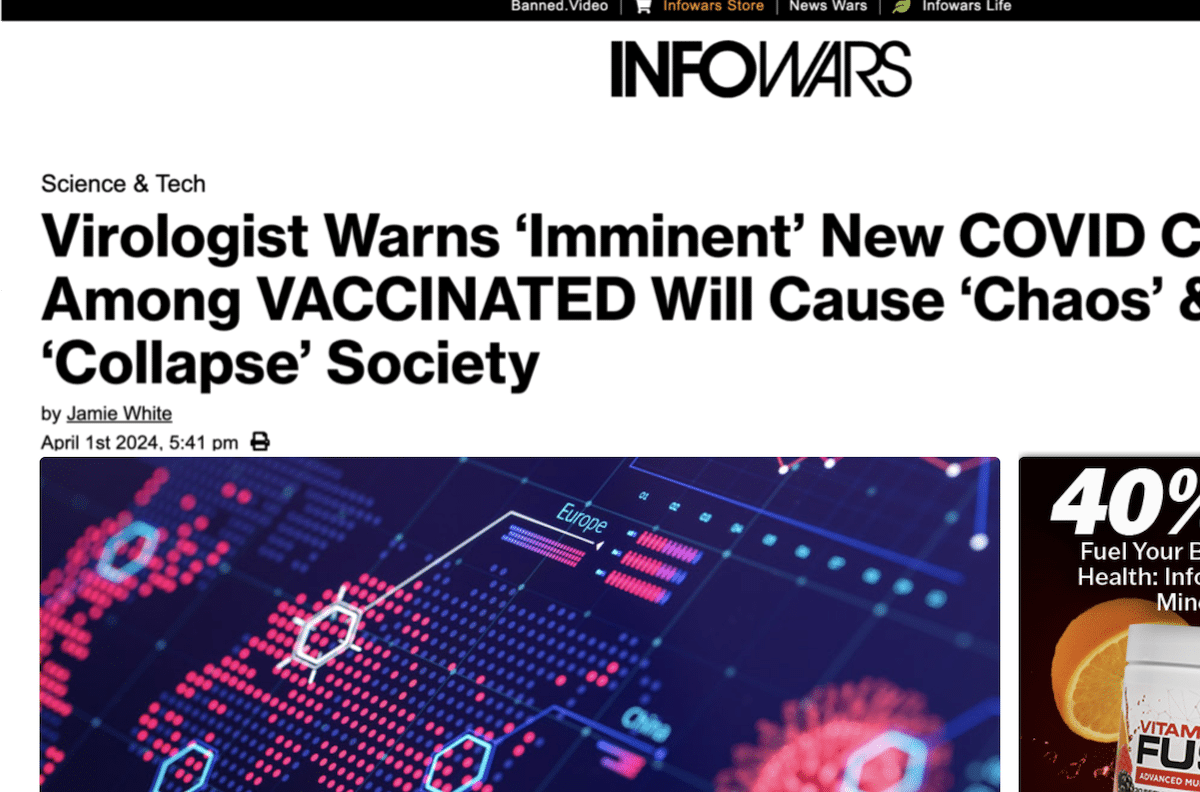- Health
Clip of Anthony Fauci discussing potential vaccine safety concerns is from March 2020; current scientific evidence shows COVID-19 vaccines reduce risk of infection and serious illness
Key takeaway
In a March 2020 Facebook Live, Anthony Fauci, the director of the U.S. National Institute of Allergy and Infectious Diseases, spoke about the importance of safety trials in vaccine development, especially making sure any future COVID-19 vaccines did not make infection worse. The statement was made nine months before the first COVID-19 vaccine was authorized by the FDA and doesn’t refer to current authorized and approved COVID-19 vaccines. It also doesn't reflect the amount of knowledge that scientists have gained since that time demonstrating the vaccines’ safety and effectiveness. Vaccinated people are actually less likely to be infected or develop severe COVID-19, which is the opposite of what we would expect if the vaccines caused ADE.
Reviewed content

Verdict:
Claim:
“Dr. Fauci opens up the possibility that the COVID-19 vaccine could be making people more likely to be infected by the virus”, “a vaccine that looked good in initial safety actually made people worse”
Verdict detail
Misleading: The clip of Anthony Fauci discussing concerns about a vaccine that could potentially cause more severe illness originated from a Facebook Live done in March 2020, nine months before the first COVID-19 vaccine was authorized in the U.S. The fact that the video was made more than a year ago was omitted in these posts, perhaps to give viewers the false impression that Fauci was expressing those concerns as if they were still current. But scientific evidence gathered since that time show that vaccinated people are less likely to be infected and to be seriously ill—the opposite of what would happen if ADE did occur.
Full Claim
“Dr. Fauci opens up the possibility that the COVID-19 vaccine could be making people more likely to be infected by the virus”; “This would not be the first time that if it happened, that a vaccine that looked good in initial safety actually made people worse”.
Review
A 19 March 2020 Facebook Live conversation between Facebook CEO Mark Zuckerberg and Anthony Fauci, the director for the U.S. National Institute of Allergy and Infectious Disease, was recently used to spread misinformation about the COVID-19 vaccines. Individuals on a number of social media platforms, including Facebook (see here), Twitter (see here) and even LinkedIn (see here), shared a short clip of the conversation to claim that Fauci admitted that “the COVID-19 vaccine could be making people more likely to be infected by the virus”. As we’ll show below this is not true.
In the almost 38-minute conversation from March 2020, Zuckerberg and Fauci touched on a number of aspects about the early months of the COVID-19 pandemic, such as testing and how to limit transmission of the virus. Fauci also spoke about the development of COVID-19 vaccines; his statements were made about nine months before the first COVID-19 vaccine was authorized by the U.S. Food and Drug Administration (FDA) on 11 December 2020.
At around the 22:20 minute mark, Zuckerberg asked a question about the timeframe for the development of the COVID-19 vaccines. After discussing vaccine development and safety trials, Fauci said that when it comes to safety, it’s also important to make sure that “if you vaccinate someone, and they make an antibody response, and then they get exposed and infected, does the response that you induce actually enhance the infection and make it worse” (25:05 minutes). Later Fauci also said that, “this would not be the first time, if it happened, that a vaccine that looked good in initial safety [trials] actually made people worse”.
Based on the above description, Fauci was likely talking about antibody-dependent enhancement (ADE), a condition that occurs when antibodies can recognize and bind to a pathogen, but favor the infection instead of preventing it. The Children’s Hospital of Philadelphia says that when ADE occurs, “these antibodies act as a ‘Trojan horse,’ allowing the pathogen to get into cells and exacerbate the immune response”. The result of ADE is often a more severe illness in someone who has antibodies to the virus compared to someone who doesn’t.
ADE may occur after certain infections (such as with the dengue virus) and following vaccination. Vaccine trials done in the 1960s, for instance, found that a respiratory syncytial virus (RSV) vaccine candidate made the respiratory disease worse in vaccinated children who later became infected with the virus. Those trials were stopped and that RSV vaccine candidate was not submitted for approval.
In March 2020, Fauci spoke about the importance of vaccine trials to ensure any future COVID-19 vaccines wouldn’t “enhance the infection and make it worse”. Since then it has become clear that there is no evidence that the COVID-19 vaccines cause ADE. In fact, the vaccines do the opposite: they are especially effective at preventing severe disease, hospitalization and death from COVID-19. These observations aren’t consistent with the claim that the COVID-19 vaccines cause ADE.
Despite this lack of evidence, claims regarding ADE were made multiple times, and Health Feedback fact-checked a number of such claims. In a review from November 2020, Health Feedback showed that ADE wasn’t observed during the clinical trials for the COVID-19 vaccines. Another review from July 2021, after vaccination campaigns had been going on for a number of months, noted that there was no evidence of more severe illness in fully vaccinated persons who became infected with SARS-CoV-2.
In short, a clip from a March 2020 Facebook Live where Fauci spoke about COVID-19 vaccine development and the need to make sure the vaccines don’t enhance infection was misleadingly used in December 2021 to make it appear as if Fauci currently harbored doubts about the safety of the current COVID-19 vaccines. The fact that the video was made more than one year ago was omitted in these posts, perhaps to give viewers the false impression that Fauci currently harbors those concerns.
The first COVID-19 vaccine was authorized by the FDA nine months after that Facebook Live, and Fauci’s statements in March 2020 don’t reflect the knowledge that scientists have gained about the safety of the COVID-19 vaccines since that time. There is no evidence from either the clinical trials or during the vaccination campaigns to suggest that the COVID-19 vaccines enhance infection and cause more serious illness in vaccinated persons. In fact, researchers observe the opposite effect: that vaccination reduces the risk of infection and serious illness.



